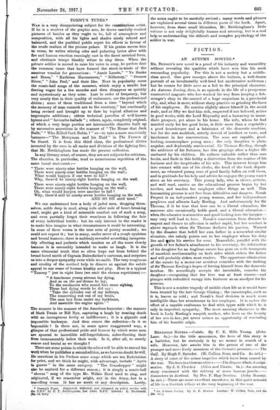FICT ION.
AN AUTUMN SOWING..
Ma. Sesser's new novel is a proof of his industry and versatility without revealing the qualities which have won him his most resounding popularity. For this Is not a society but a middle- class novel. One peer emerges above the horizon, a well-drawn portrait of an invulnerably well-bred but unobtrusive nobleman ; but he counts for little save as a foil to the principal character. An Autumn Sowing, then, is an episode in the life of a prosperous commercial magnate who has worked his way from keeping a fish- monger's shop to the control of a huge emporium in a provincial city, and,what is more, without sharp practice or grinding the face. of his employees. He marries slightly above himself in the social scale, and at fifty wo find him rich, respected if not beloved, active in good works, with the Lord Mayoralty and a baronetcy in imme- diate prospect, yet alone in his home. His wife, whom he had married early for her good looks, is little more than a vegetable ; a good housekeeper and a lubricator of the domestic machine, but for the rest snobbish, utterly devoid of intellect or taste, and incoherent in her conversation. The sons are capable, good- looking, commonplace young men ; the only daughter is plain, angular, and deplorably sentimental. Sir Thomas Keeling, though the architect of his fortunes, has dim gropings after a higher life unshared by his children. He collects valuable rather than rare hooka, and finds in this hobby a distraction from the routine of his business and the ineptitudes of his wife. This interest brings him into contact with one of his clerks, the head of the book depart- ment, an educated young man of good family fallen on evil times, and in gratitude for his help and advice he engages the young man's sister as his secretary. This young lady, who is clever, artistic, and well read, carries on the educational process begun by her brother, and teaches her employer other things ea well.. This humanizing process is not free from difficulties and dangers. Norah Propert is an independent young woman, and her independence perplexes and affronts Lady Keeling. And unfortunately fur Sir Thomas, if it be true that love can be a liberal education, the converse also occasionally holds good, and a liberal education— when the educator is attractive and good-looking into the bargain— may very well lead to love. Norah's conversion from diskette to respect and thence to affection is rather rapid, but her conduct is above reproach when Sir Thomas declares his passion. Warned by the disaster that befell her own father in a somewhat similar situation, she calmly points out to her employer where his duty lies and suite his service for ever. Meanwhile, parallel with the growth of her father's attachment to his secretary. the infatuation of his daughter for an Anglican curate has gone on with transports of mawkish sentimentality on both sides which 'sicken the father and will probably sicken moat readers. The opportune elimination of the curate by a motor-car accident coincides with the dashing of Sir Thomas Keeling's hopes of freeing himself from the domestic incubus. He accordingly accepts the inevitable, consoles his daughter—recognising that her love was at least sincere—and plunges with redoubled energy into business as an anodyne for his
/ 0170WS.
This is not a sombre tragedy of middle-class life as it would have been treated by the late George Pining ; the catastrophe, such as it is, leaves us cold ; and Norah's final decision is much more intelligible than her attachment to her employer. It is rather the effort of a capable craftsman to deal with types with which he is only in imperfect sympathy. The most amusing character in the book is Lady Keeling's waspish mother, who lives on the bounty of her eon-in-law, yet never misses an opportunity of reminding him of his humble origin.






































 Previous page
Previous page